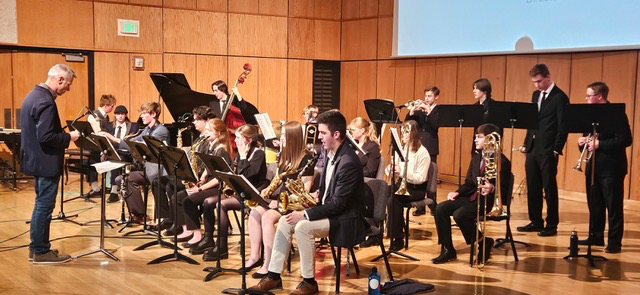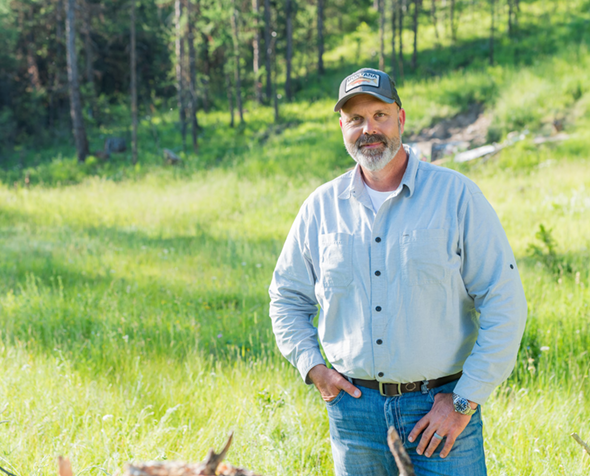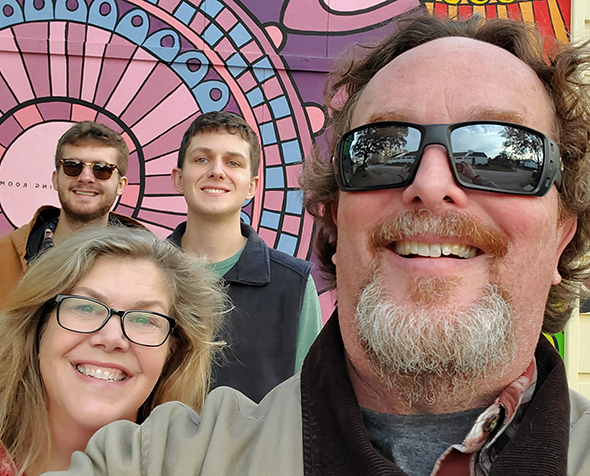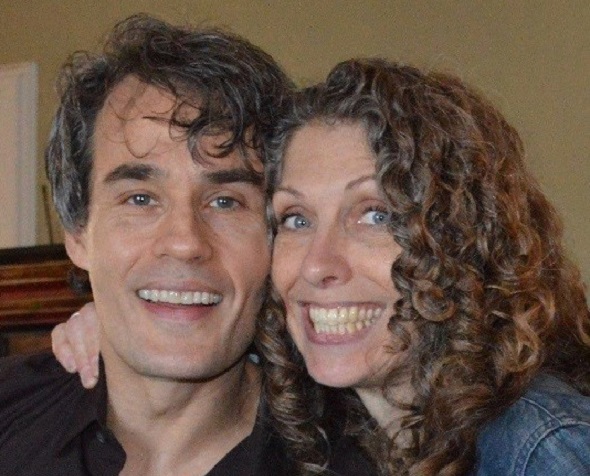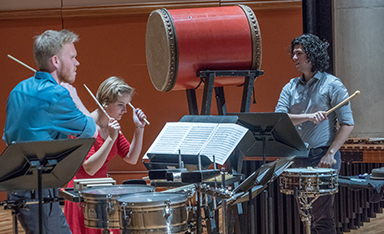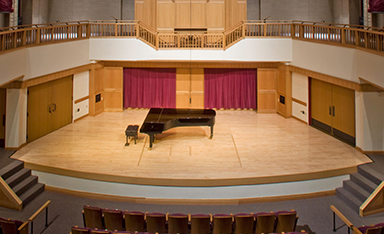Lamont Parent Profile: Stoney Black
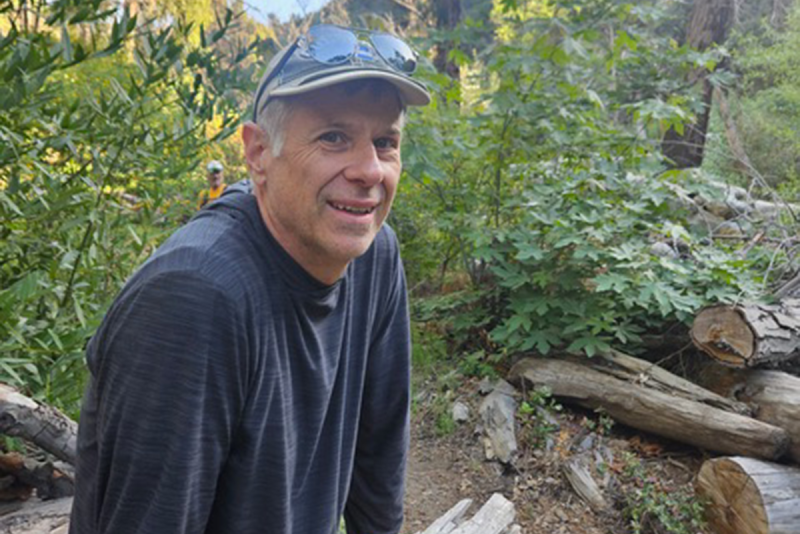
Stoney Black: A Lifelong Music Educator and Proud Lamont Parent
When Stoney Black talks about music education, his enthusiasm is contagious. The longtime Colorado band director and percussionist has spent his life building programs, nurturing students, and creating opportunities for young musicians to shine. Now, as his son Ryan pursues a Bachelor of Music in Jazz Studies at the University of Denver’s Lamont School of Music, Black is seeing the next generation of musicians—and his own family’s deep musical roots—continue to grow.
Black’s journey began in Cortez, a small town on Colorado’s Western Slope. “I was really lucky,” he says. “We had an incredible band program under Gary Hall. That experience opened up the world of music for me.” Though he originally wanted to play trombone, practicality intervened: his parents already owned a snare drum and drum set. “They said, ‘Why don’t you just play drums so we don’t have to buy another instrument?’” he laughs. “And the rest is history.”
That early push set Black on a lifelong path in percussion and teaching. He started his college studies at Fort Lewis College, earned a performance degree from Adams State, and later completed graduate work at the University of Northern Colorado. It was during that time, while working with percussion groups, that he realized his true calling was to teach. He earned his education degree from Metropolitan State University of Denver and began what would become a decades-long teaching career.
His first job was in Kiowa, a small town east of Elizabeth, Colorado. It was a part-time position, split between teaching band and computer technology. But Black quickly saw potential. “With the support of the superintendent, we built a full program for fifth through twelfth grade from the ground up: concert bands, jazz combos, and a marching band,” he recalls. “We even won a state championship in marching band and took our jazz band to the Reno Jazz Festival.”
After a brief year teaching in Pueblo, Black landed at Air Academy High School, located on the grounds of the U.S. Air Force Academy. The school, founded in the 1950s for military families, had evolved into a diverse public school community by the time he arrived. “When I got there, only about 20 percent of the students were children of active-duty military, and another 20 percent were retired military families,” he says. “It’s a public school, but in a really unique setting.”
Over the years, Air Academy’s band program grew into one of the most respected in the region. Under Black’s leadership, the school’s ensembles earned nine state marching band championships and four Bands of America regional titles in San Antonio and St. Louis. One of the program’s proudest moments came when they performed in the 2018 Rose Parade—a crowning achievement for any high school band director.
As his own children began showing an interest in music, Black transitioned to teaching middle school for a time so he could spend more time with them. “One of the greatest benefits of being a teacher,” he says, “is getting to share what you love with your kids.”
That connection became even more meaningful when he joined Pine Creek High School, where his wife also taught and their sons attended. There, he focused more on the jazz side of the program before eventually retiring.
Retirement, though, hasn’t slowed him down. Black now spends most weekends adjudicating marching band competitions and leading clinics across the state. “During the fall, I’m at shows almost every Saturday,” he says. “Then on Sundays, I meet with directors to offer feedback and help them strengthen their programs.” He’s also begun working with the Evergreen Jazz Festival, helping to expand its outreach by providing school clinics funded through local grants. “Jazz education is such a passion of mine,” he says. “I think we can do more in K–12 to teach kids how to play and listen in that idiom and to equip educators with the tools to teach it well.”
Music education runs deep in the Black family. Stoney’s father and grandfather were both musicians, and now all three of his sons have followed that same path. His oldest studied horn at Fort Lewis before switching gears to a career in computer science. His youngest, Tanner, is a senior trumpet player at the Denver School of the Arts. And his middle son, Ryan, is now thriving at Lamont.
“Ryan just loves it at DU,” Black says. “He sends us pictures all the time of things happening on campus. He loves the practice rooms on the fifth floor with the windows. It really shows that DU cares about students’ health and well-being.”
There’s another meaningful connection to Lamont as well: Ryan’s saxophone professor, Adam Gang, is one of Stoney’s former students from Air Academy High School. “Adam was one of Ryan’s first sax teachers, actually,” Black says with pride. “Now he’s his college professor. It’s pretty amazing to see that come full circle.”
Though he never attended DU himself—he jokes that he’s been to “every university except DU”—Stoney has long been familiar with the Lamont School of Music, having sent several of his own high school students there over the years. Now, as both a proud parent and veteran educator, he’s seen firsthand what makes Lamont special. “The faculty are so supportive,” he says. “They care about developing musicianship, but also about developing people. That’s what you want for your kids.”
As the family settles into Denver, having moved from Colorado Springs when Ryan started at DU and Tanner began at DSA, Stoney and his wife are already looking ahead to their next chapter. “Once Tanner graduates and heads off to college, we’re planning to find a place in the foothills,” he says. “Somewhere quiet, but close enough to keep working with schools and festivals.”
After decades of shaping young musicians, Stoney Black’s impact on music education in Colorado continues to resonate—in classrooms, on marching fields, and now, in his own family’s journey through Lamont. “It’s been a gift to see how music connects everything,” he says. “You never really stop teaching, and you never stop learning.”

